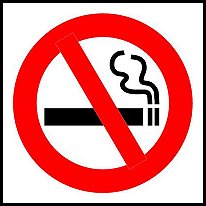Maasin City walks the
talk on RA 9211
By BONG PEDALINO, PIA Southern
Leyte
February
24, 2011
MAASIN CITY, Southern
Leyte – There is a law against smoking, especially in public
places. Or there was a law about it, Republic Act 9211, since it was
already signed by the President nearly eight years ago, on June 23,
2003.
 The long title of RA
9211 is this: An Act Regulating the packaging, use, sale, distribution
and advertisements of tobacco products and for other purposes. Its
short title, however, is really short: Tobacco Regulation Act of 2003.
The long title of RA
9211 is this: An Act Regulating the packaging, use, sale, distribution
and advertisements of tobacco products and for other purposes. Its
short title, however, is really short: Tobacco Regulation Act of 2003.
Whether we go by the
long or the short title, the fact remains that implementation of RA
9211 has been alive and well, in spirit and in letter, here in Maasin
City, Southern Leyte province.
In less than two years
since this law was introduced in this city, on April 19, 2009, several
landmark activities have been undertaken by the city government to
show it is serious in the campaign to rid the city of smokers, or at
least to regulate their puffing of cigarettes and tobacco in selected,
designated areas – under pain of reprimand or citation tickets once
caught by enforcers doing so in public places.
But what are “public
places”? Section 4 of RA 9211 provided a categorical definition:
these refer to enclosed or confined areas of all hospitals, medical
clinics, schools, public transportation terminals and offices, and
buildings, such as private and public offices, recreational places,
shopping malls, movie houses, restaurants, and the like.
So, on May 31, 2009,
less than two months since RA 9211 was first introduced, the city
government launched its no-smoking program (NSP) and thus banned for
good smoking habits in the locations mentioned earlier.
What followed was a
tremendous information drive on the NSP, with implementers invariably
interacting with local businessmen, motorcab drivers, potpot drivers,
with matching posting of stickers on these vehicles, and stringing
tarpaulins with graphic ill effects of smoking – a scare campaign, if
you will – in many points around the city where people usually
converged.
The Police’s patrol
car with its public address system was also utilized in roving around
the city, informing people of the law and the city’s response to it,
the NSP.
Those who want to quit
smoking on their own or with expert advice will have someone to teach
them, as the city embarked on a week-long training, from August 23-28,
on smoking cessation.
On September 28, 2009,
a Smoke-free Task Force was created, intensifying efforts at rounding
violators, with Healthy City Initiatives (HCI) Enforcers issuing
citation tickets to those caught in the act.
By February 26, 2010,
City Memorandum Order 099 banned the sponsorship of events by any
tobacco or cigarette company and, before long, advertisement posters
and billboards anywhere around the city were removed.
Then by December 30,
2010, City Mayor Maloney Samaco issued Memorandum Order 373 which
required all casual and job order employees to get a certificate of
non-smoker from the City Health Office as a mandatory requirement for
renewal of employment.
Smoking employees were
forced to quit or reduce their habit in this manner by sheer need, but
many also were happy it was imposed that way, saying the NSP program
really works, aside from the health benefits an individual can enjoy
by simply following the law.
Still, “total
vigilance is needed,” Samaco said, hopeful that in the end people can
appreciate that what the city has been doing is for their own good.
Indeed, his efforts
have been noticed, with the city awarded as the Urban Health Champion
for 2010 and a Red Orchid Award, also in 2010, by the Department of
Health (DOH).
Samaco, a non-smoker
himself, pledged to continue his advocacy on anti-smoking even beyond
the expiration of his full nine-year term as local chief executive,
saying that even in his personal capacity he will forever push for a
smoke-free Maasin City.
And Samaco has walked
his talk, even this early, judging by the Maasin City experience in
implementing RA 9211.